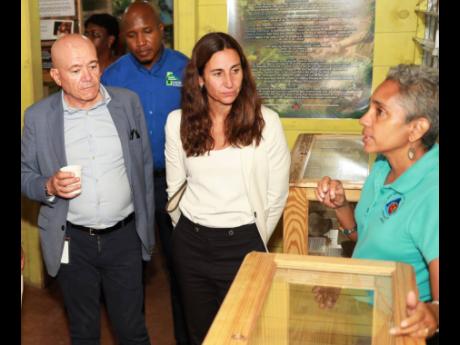JCDT gets European Union lifeline
The Jamaica Conservation and Development Trust (JCDT) has received a €280,000 grant from the European Union (EU) towards preservation of the Blue and John Crow Mountains, which will go a far way in advancing its work, according to JCDT Executive Director Dr Susan Otuokon.
“It will help with sustainability because there is a component that’s looking at our business development arm. We’ve never been able to have a business development officer before. So we are embarking on some new business development activities and those are linked mostly to tourism and that’s critical sustainability because we kind of just live from project to project.
“It will allow for the continuation of our work in conservation, compliance and enforcement, and we also have an important community research component where we are trying to get a better understanding of why community members are still continuing some negative environmental practices; in particular the use of the fire–slash-and-burn technique for clearing land to plant crops. There have been a lot of public awareness activities but some people are still doing it. So we need to try to gain a better understanding of what’s not working so that we can adjust what we’re doing, because there is no point continuing the same old thing if it’s not making any difference,” Otuokon said.
The announcement was made during the recent official launch of ‘Conserving the Forests of the Blue and John Crow Mountains’ at the Holywell Recreational Park, a partnership between the JCDT, the EU and the Forestry Department. The two-year programme is set to end on November 30, 2023.
FINANCIAL CHALLENGES
Addressing the launch, head of cooperation for the EU Delegation to Jamaica, Aniceto Rodriguez Ruiz, stressed the importance of involving civil societies in national forest management and conservation. “The European Union has been partnering with the Government of Jamaica to address the country’s climate change response but it would be remiss of us not to work with civil societies. The European Union believes in the value and importance of very strong civil societies, as they are essential to complementing the efforts of the governments.”
For that reason, sustainability and getting a better understanding of the different communities associated with the park are high on its agenda. But financial challenges continue to hinder the JCDT’s effectiveness. The situation has worsened with the COVID-19 pandemic, with the Government slashing its subvention in half.
“Most of our funds are from projects. We get a small amount of money from Government and, since COVID-19, it has decreased by about 50 per cent. It used to be about 30 per cent of our budget but now it is about 15 per cent. So that has really had a significant negative impact and I guess we are just lucky now to have a number of projects, including the EU one, but they are projects and, at the end of next year, we are likely to be back to square one. That is why it is important to try to improve our sustainability.
“So financial concerns are a constant as well as trying to get improved buy-in from the people who live in the area, most of whom support our programmes and feel positive about the national park and recognise the significance of conservation. But then I think that, when economic realities hit them, they revert to doing some negative things.”
The EU’s support is in line with its national project, ‘Addressing Environmental and Climate Change challenges through Improved Forest Management in Jamaica’. The project is geared towards building more effective community education and outreach programmes, improving forest conservation and the creation and maintenance of sustainable community livelihoods, particularly among Maroon and other communities and youth. The grant will also allow for improved management effectiveness through enforcement, compliance and financial sustainability programmes.
The Blue and John Crow Mountains National Park protects just over 41,000 hectares of forest in eastern Jamaica, including the 26,000-hectare World Heritage Site at its core, which comprises most of the island’s remaining closed broadleaf or natural forest. Management of the national park is guided by a 10-year plan detailing programmes aimed at preserving the natural forest at the core, restoring degraded forests and facilitating sustainable livelihoods in local communities.

